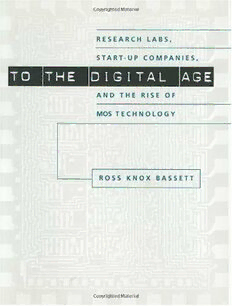
To the digital age: research labs, start-up companies, and the rise of MOS technology PDF
439 Pages·2002·1.051 MB·English
Most books are stored in the elastic cloud where traffic is expensive. For this reason, we have a limit on daily download.
Preview To the digital age: research labs, start-up companies, and the rise of MOS technology
Description:
The metal-oxide-semiconductor (MOS) transistor is the fundamental element of digital electronics. The tens of millions of transistors in a typical home—in personal computers, automobiles, appliances, and toys—are almost all derive from MOS transistors. To the Digital Age examines for the first time the history of this remarkable device, which overthrew the previously dominant bipolar transistor and made digital electronics ubiquitous. Combining technological with corporate history, To the Digital Age examines the breakthroughs of individual innovators as well as the research and development power (and problems) of large companies such as IBM, Intel, and Fairchild.Bassett discusses how the MOS transistor was invented but spurned at Bell Labs, and then how, in the early 1960s, spurred on by the possibilities of integrated circuits, RCA, Fairchild, and IBM all launched substantial MOS R & D programs. The development of the MOS transistor involved an industry-wide effort, and Bassett emphasizes how communication among researchers from different firms played a critical role in advancing the new technology. Bassett sheds substantial new light on the development of the integrated circuit, Moore's Law, the success of Silicon Valley start-ups as compared to vertically integrated East Coast firms, the development of the microprocessor, and IBM's multi-billion-dollar losses in the early 1990s. To the Digital Age offers a captivating account of the intricate R & D process behind a technological device that transformed modern society.
See more
The list of books you might like
Most books are stored in the elastic cloud where traffic is expensive. For this reason, we have a limit on daily download.
